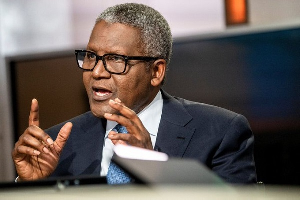THE assets and bank accounts of some suspected drug barons have been frozen by the Serious Fraud Office (SFO).
Though officials of the SFO are tight-lipped on the names of the affected barons, they are believed to include the five suspected men at the centre of the MV Benjamin missing cocaine saga.
A source at the SFO head office in Accra dropping the hint to the Times said the Accra High Court yesterday granted the legal backing, to the SFO’s motion "to freeze the assets and bank accounts of those persons."
Kwabena Amaning, also known as Tagor, Issah Abass, Kwabena Acheampong and Kwadwo Ababio initially appeared before the five-member Justice Georgina Wood Committee to assist in its investigations to unravel the loss of the drugs.
However, they were later arrested at the committee premises and provisionally charged with conspiracy, engaging in prohibited business rated to narcotic drugs, establishing and promoting enterprise relating to narcotic drugs.
The source confirmed that those involved were mostly suspected narcotic drug dealers, some of whom are currently standing trial, adding, "our public relations outfit will issue a press release to throw more light on the matter.”
Meanwhile, an Accra Circuit Court yesterday refused bail to the five people charged over the disappearance of the 77 parcels of cocaine from MV Benjamin.
The five, Kwabena Amaning, also called Tagor; Issah Abass, Kwabena Acheampong, Kwadwo Ababio and Victor Kisseh, alias Yaw Billah, are to appear before the court again on September 21.
They are facing provisional charges of conspiracy, engaging in prohibited business related to narcotic drugs, establishing and promoting enterprise relating to narcotic drugs.
Deputy Superintendent of Police DSP Abichab Boye, prosecuting, told the court: “We are still investigating. We want a few more weeks and hopefully we shall give the court good news.
But Nana Asante Bediatuo, counsel for Tagor, renewing his application for bail said “this is completely unconstitutional. We wonder the kind of law that the prosecution is using to incarcerate the accused persons.”
He said if the police were not ready to prefer appropriate charges against the five men, the court had the right to release them on bail and place reasonable restrictions on them.
Mr. Osafo Buabeng, representing Abass said, “looking at the facts, an offence relating to narcotics has not been established against my client to warrant the interpretation of Act 714 which has been amended under the Criminal Procedure Code.”
Speaking for Acheampong, Gilbert Budu said: “This is a clear abuse of the processes of the court. It must not be seen as if the courts are there to listen to the police alone.”
Mr. Agyei Mensah, who represented Ababio said: “The provisional facts do not fit the offence for which my client has been charged.”
Counsel for Billah, R.S. Blay, for his part said my client does not come into the matter at all.”
The judge in reminding them said: “Between the last adjourned date and today, there has not been any change in your submissions for me to change my mind.”
He therefore advised counsel to apply for bail in a higher court.
The lawyers subsequently prayed the court to fix a date for full trial to commence. This prompted the judge to warn the prosecution to prosecute the case if there was a prime facie case established or drop the charges.
“You should not let the public get the impression that once an accused person is remanded in custody, it should be the end of the case,” the judge advised the police.
General News of Friday, 8 September 2006
Source: Ghanaian Times
Suspected Drug Barons' Assets Frozen













